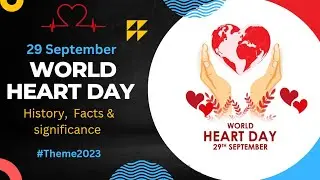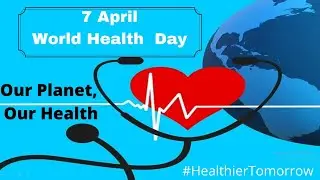World Health Day | 10 lines On World Health Day | Why do we celebrate world health day on 7 April
World Health Day 2022 (Our Planet, Our Health) #HealthierTomorrow
It is celebrated annually to draw attention to a specific health topic of concern to people all over the world. In our planet, climate change is impacting human lives and health in a variety of ways. It threatens the essential ingredients of good health - clean air, safe drinking water, nutritious food supply, and safe shelter - and has the potential to undermine decades of progress in global health and wellbeing
Areas with weak health infrastructure – mostly in developing countries – will be the least able to cope without assistance to prepare and respond to climate change. WHO supports countries in building climate-resilient health systems and tracking national progress in protecting health from climate change.
Climate change affects the social and environmental determinants of health – clean air, safe drinking water, sufficient food and secure shelter.
Reducing emissions of greenhouse gases through better transport, food and energy-use choices results in improved health, particularly through reduced air pollution.
The direct damage costs to health (i.e. excluding costs in health-determining sectors such as agriculture and water and sanitation), is estimated to be between USD 2-4 billion/year by 2030.
Climate change is the single biggest health threat facing humanity, and health professionals worldwide are already responding to the health harms caused by this unfolding crisis.
The Intergovernmental Panel on Climate Change (IPCC) has concluded that to avert catastrophic health impacts and prevent millions of climate change-related deaths, the world must limit temperature rise to 1.5°C.
Past emissions have already made a certain level of global temperature rise and other changes to the climate inevitable. Global heating of even 1.5°C is not considered safe, however; every additional tenth of a degree of warming will take a serious toll on people’s lives and health
Climate change is already impacting health in a myriad of ways, including by leading to death and illness from increasingly frequent extreme weather events, such as heatwaves, storms and floods, the disruption of food systems, increases in zoonoses and food-, water- and vector-borne diseases, and mental health issues. Furthermore, climate change is undermining many of the social determinants for good health, such as livelihoods, equality and access to health care and social support structures. These climate-sensitive health risks are disproportionately felt by the most vulnerable and disadvantaged, including women, children, ethnic minorities, poor communities, migrants or displaced persons, older populations, and those with underlying health conditions.
Although it is unequivocal that climate change affects human health, it remains challenging to accurately estimate the scale and impact of many climate-sensitive health risks. However, scientific advances progressively allow us to attribute an increase in morbidity and mortality to human-induced warming, and more accurately determine the risks and scale of these health threats.
#WorldHealthDay
#Whydowecelebrateworldhealthdayon7April
#HealthierTomorrow
#10LinesonWorldHealthDay
#OurPlanetOurHealth
#10EasyLinesOnWorldHealthDay
#SpeechOnWorldHealthDay



















